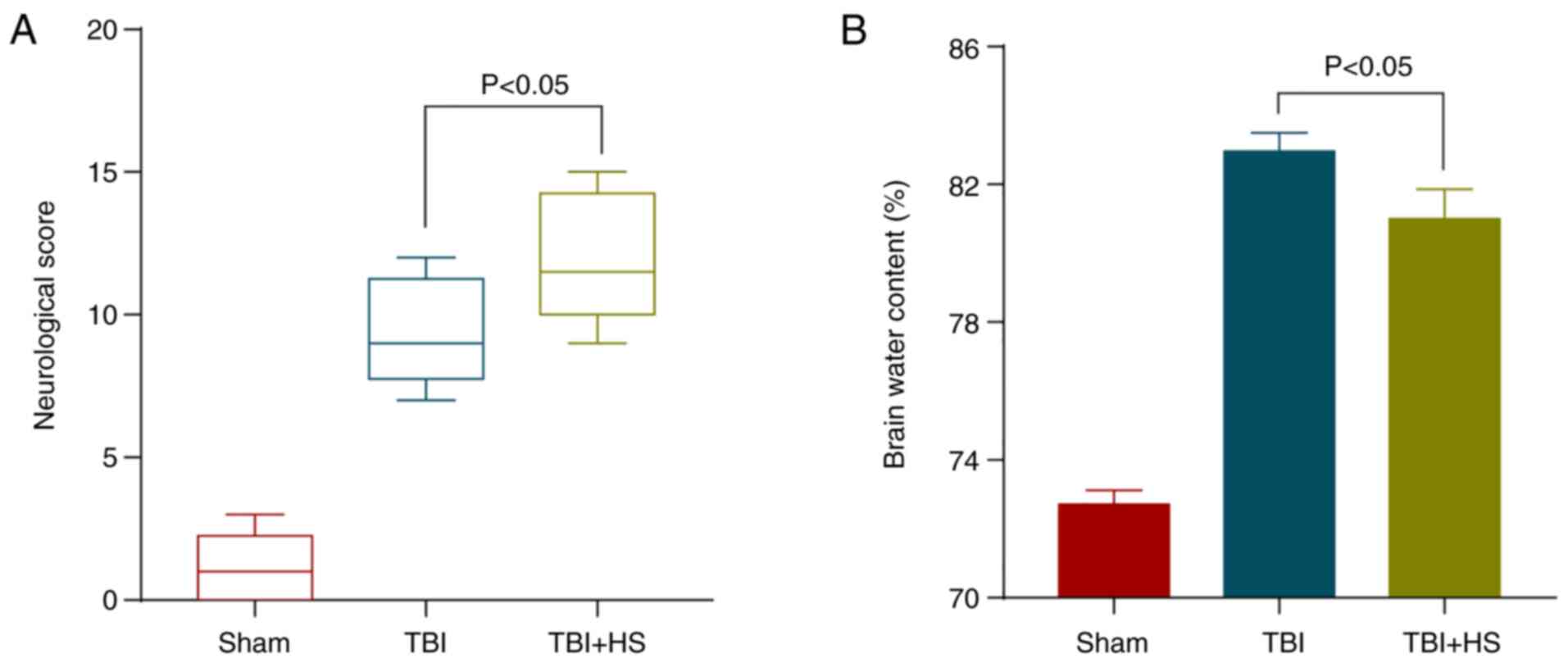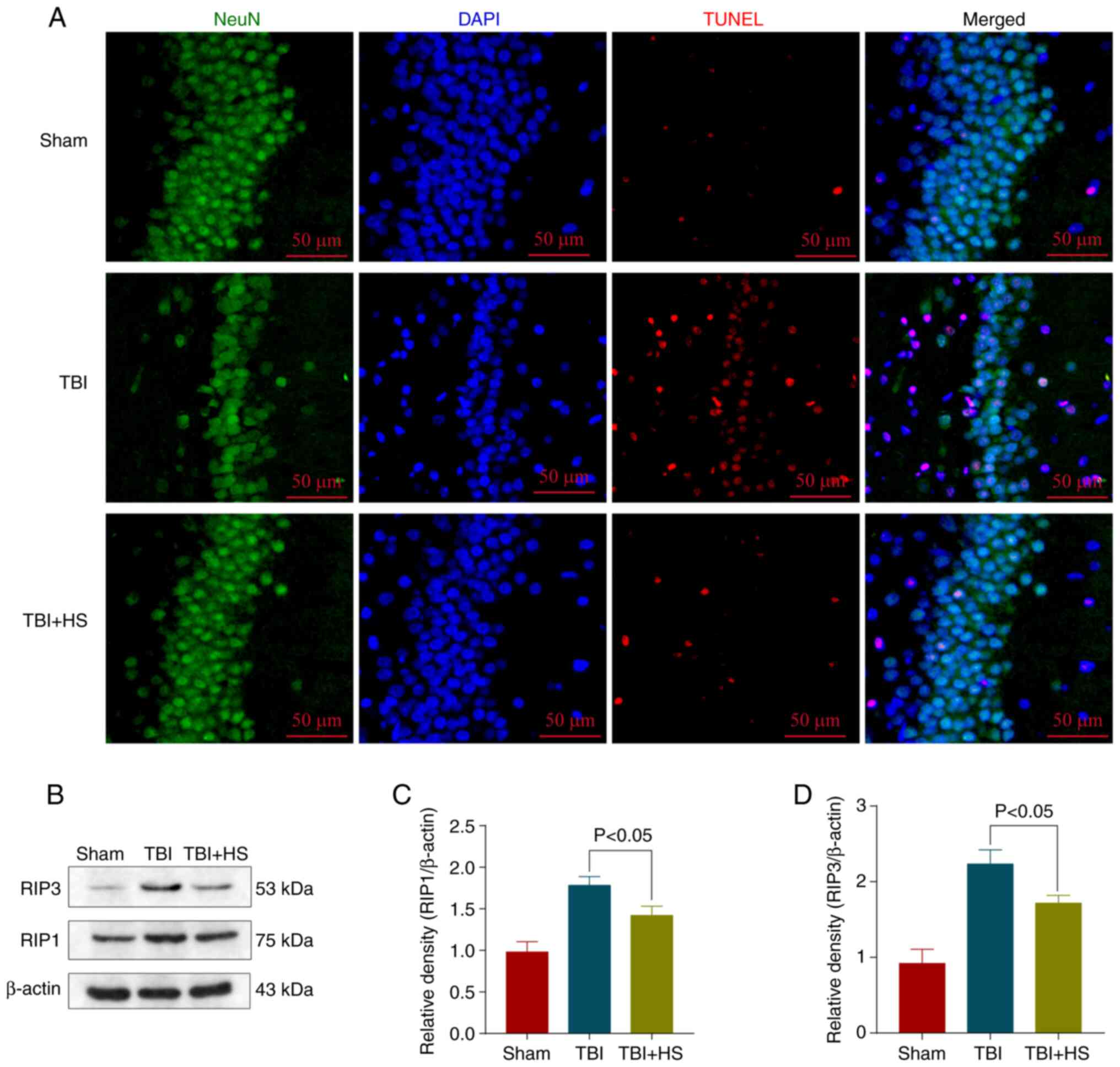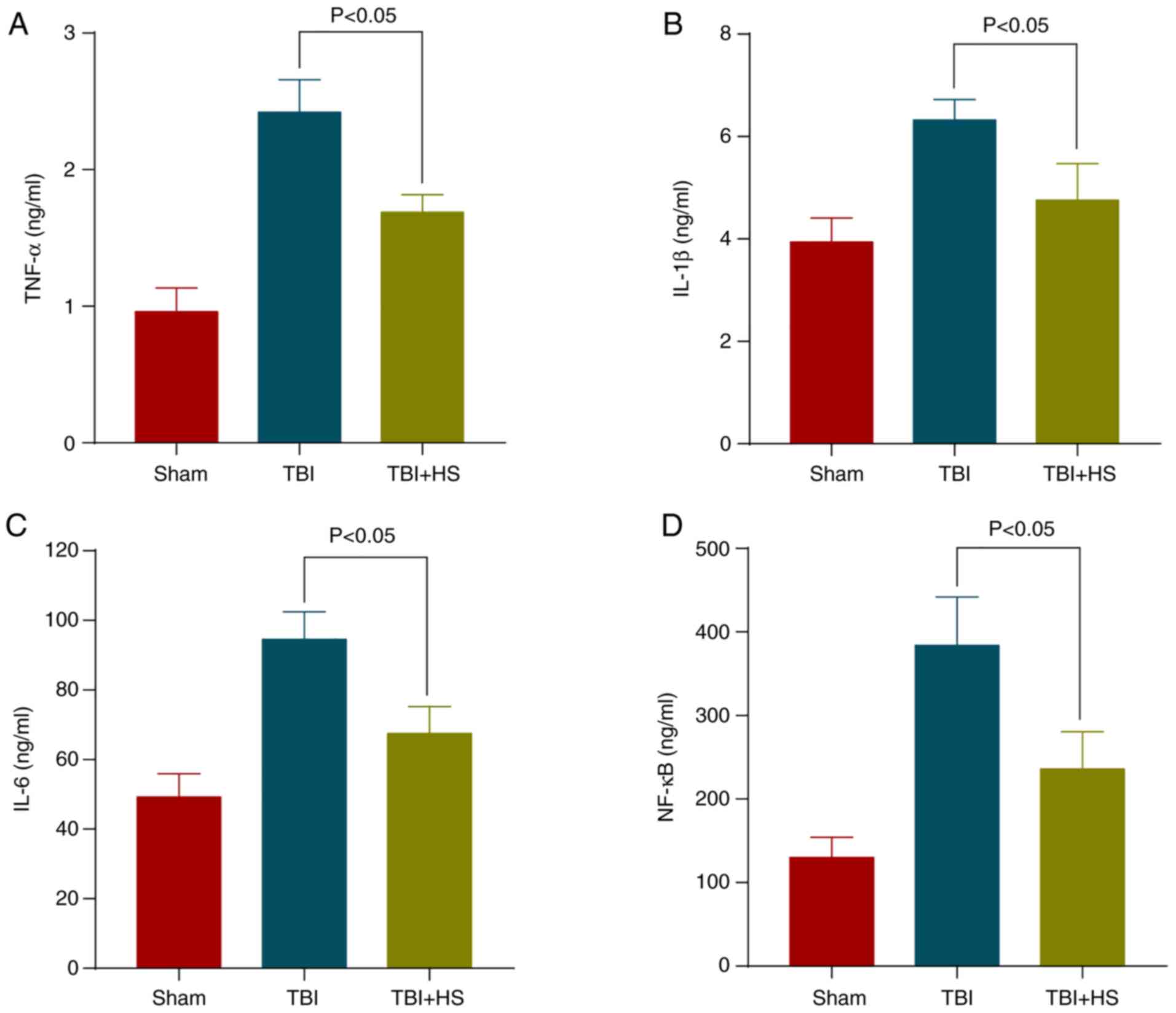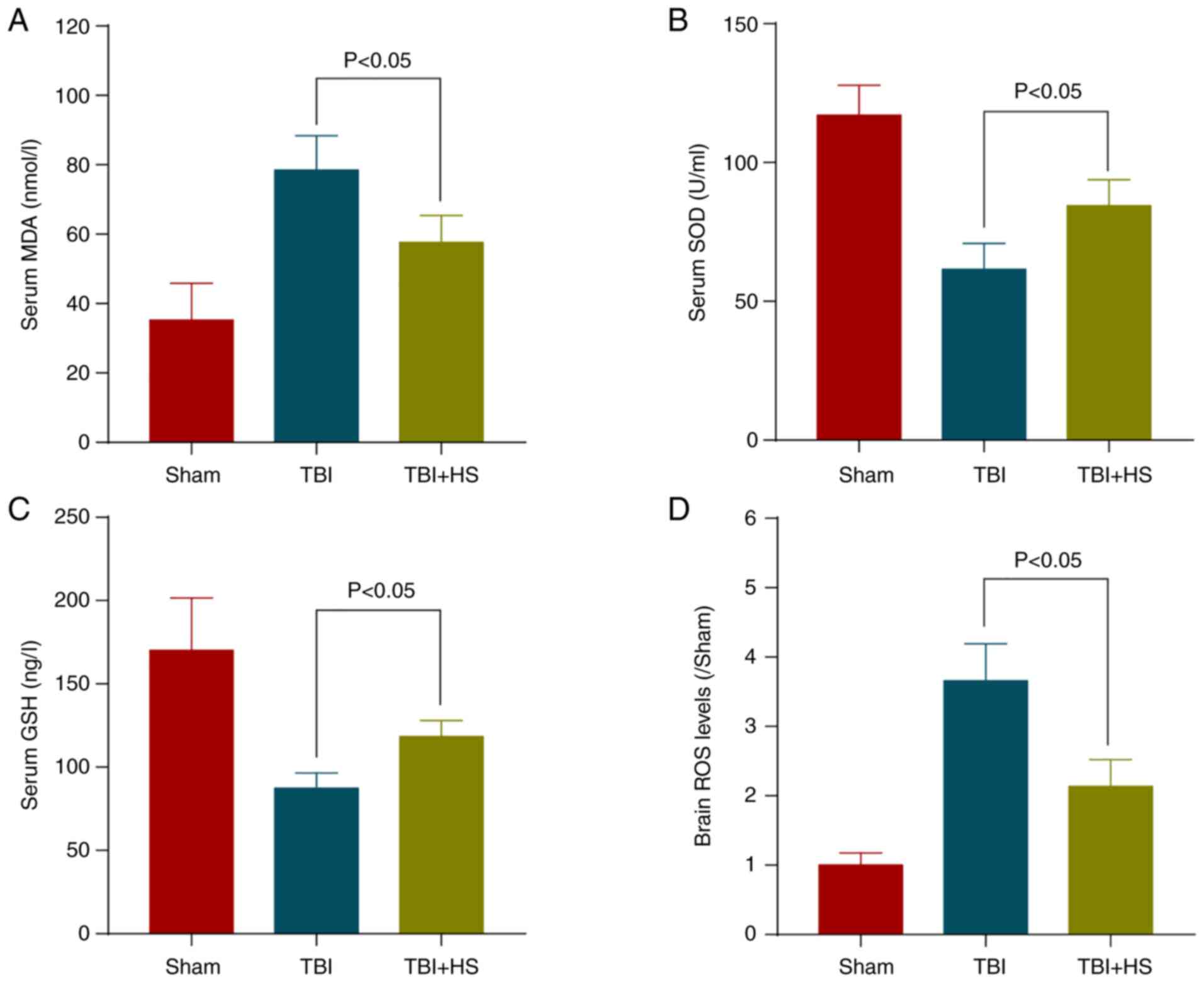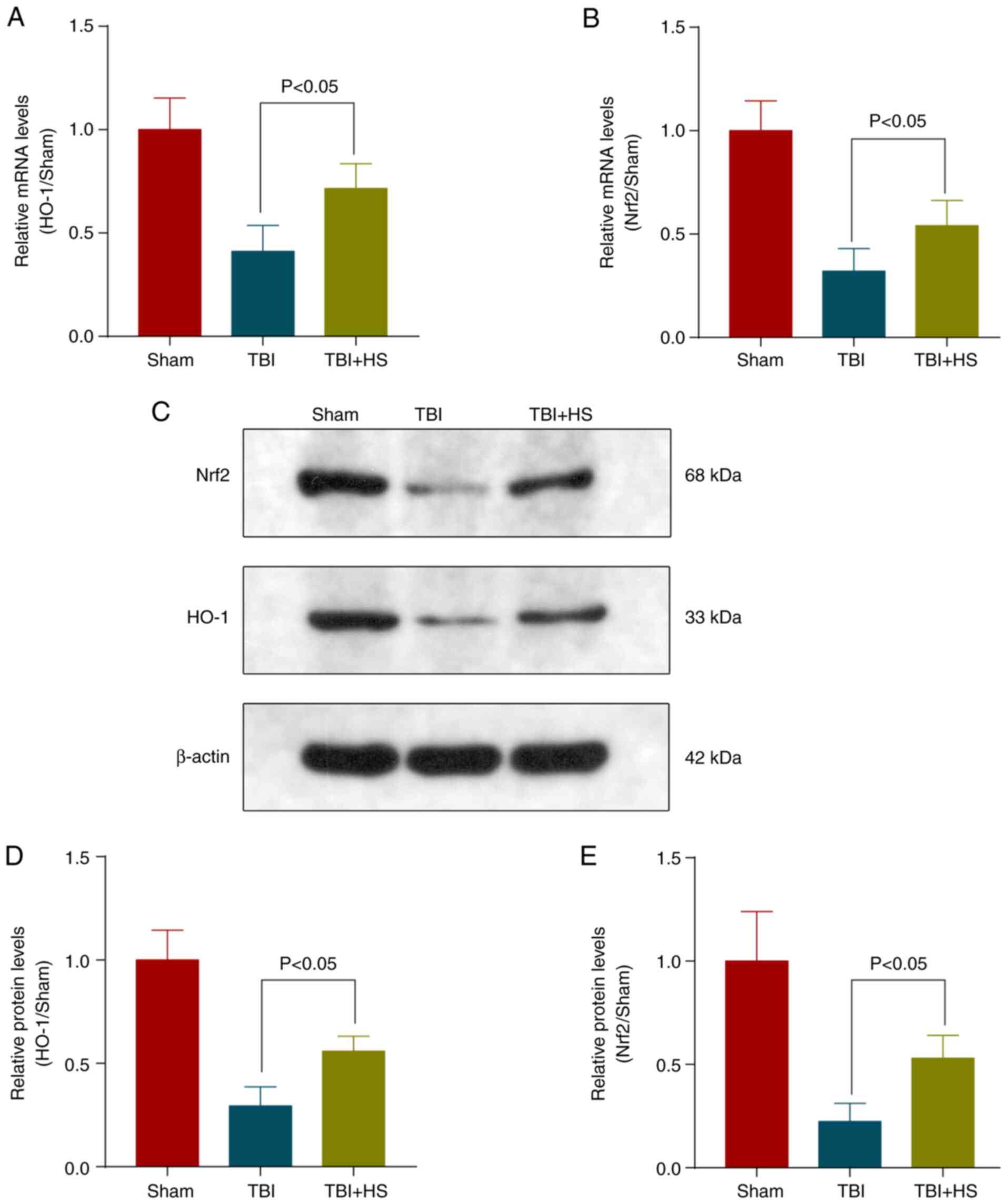|
1
|
Jiang JY, Gao GY, Feng JF, Mao Q, Chen LG,
Yang XF, Liu JF, Wang YH, Qiu BH and Huang XJ: Traumatic brain
injury in China. Lancet Neurol. 18:286–295. 2019.PubMed/NCBI View Article : Google Scholar
|
|
2
|
Chen J, Li M, Chen L, Chen W, Zhang C,
Feng Y, Wang Y and Chen Q: The effect of controlled decompression
for severe traumatic brain injury: A randomized, controlled trial.
Front Neurol. 11(107)2020.PubMed/NCBI View Article : Google Scholar
|
|
3
|
Chen JH, Li PP, Yang LK, Chen L, Zhu J, Hu
X and Wang YH: Value of ventricular intracranial pressure
monitoring for traumatic bifrontal contusions. World Neurosurg.
113:e690–e701. 2018.PubMed/NCBI View Article : Google Scholar
|
|
4
|
Nichol A, French C, Little L, Haddad S,
Presneill J, Arabi Y, Bailey M, Cooper DJ, Duranteau J, Huet O, et
al: Erythropoietin in traumatic brain injury (EPO-TBI): A
double-blind randomised controlled trial. Lancet. 386:2499–2506.
2015.PubMed/NCBI View Article : Google Scholar
|
|
5
|
Hutchinson PJ, Kolias AG, Timofeev IS,
Corteen EA, Czosnyka M, Timothy J, Anderson I, Bulters DO, Belli A,
Eynon CA, et al: Trial of decompressive craniectomy for traumatic
intracranial hypertension. N Engl J Med. 375:1119–1130.
2016.PubMed/NCBI View Article : Google Scholar
|
|
6
|
Cooper DJ, Nichol AD, Bailey M, Bernard S,
Cameron PA, Pili-Floury S, Forbes A, Gantner D, Higgins AM, Huet O,
et al: Effect of early sustained prophylactic hypothermia on
neurologic outcomes among patients with severe traumatic brain
injury: The POLAR randomized clinical trial. JAMA. 320:2211–2220.
2018.PubMed/NCBI View Article : Google Scholar
|
|
7
|
Wright DW, Yeatts SD, Silbergleit R,
Palesch YY, Hertzberg VS, Frankel M, Goldstein FC, Caveney AF,
Howlett-Smith H, Bengelink EM, et al: Very early administration of
progesterone for acute traumatic brain injury. N Engl J Med.
371:2457–2466. 2014.PubMed/NCBI View Article : Google Scholar
|
|
8
|
Robertson CS, Hannay HJ, Yamal JM,
Gopinath S, Goodman JC and Tilley BC: Epo Severe TBI Trial
Investigators. Baldwin A, Rivera Lara L, Saucedo-Crespo H, et al:
Effect of erythropoietin and transfusion threshold on neurological
recovery after traumatic brain injury: A randomized clinical trial.
JAMA. 312:36–47. 2014.PubMed/NCBI View Article : Google Scholar
|
|
9
|
Wang Y, Wang L, Hu T, Wang F, Han Z, Yin
Z, Ge X, Xie K and Lei P: Hydrogen improves cell viability partly
through inhibition of autophagy and activation of PI3K/Akt/GSK3β
signal pathway in a microvascular endothelial cell model of
traumatic brain injury. Neurol Res. 42:487–496. 2020.PubMed/NCBI View Article : Google Scholar
|
|
10
|
Li H, Lu C, Yao W, Xu L, Zhou J and Zheng
B: Dexmedetomidine inhibits inflammatory response and autophagy
through the circLrp1b/miR-27a-3p/Dram2 pathway in a rat model of
traumatic brain injury. Aging (Albany NY). 12:21687–21705.
2020.PubMed/NCBI View Article : Google Scholar
|
|
11
|
Wang Y, Zhao M, Shang L, Zhang Y, Huang C,
He Z, Luo M, Wu B, Song P, Wang M and Duan F: Homer1a protects
against neuronal injury via PI3K/AKT/mTOR signaling pathway. Int J
Neurosci. 130:621–630. 2020.PubMed/NCBI View Article : Google Scholar
|
|
12
|
Vandenabeele P, Galluzzi L, Vanden Berghe
T and Kroemer G: Molecular mechanisms of necroptosis: An ordered
cellular explosion. Nat Rev Mol Cell Biol. 11:700–714.
2010.PubMed/NCBI View
Article : Google Scholar
|
|
13
|
Chen T, Yang LK, Zhu J, Hang CH and Wang
YH: The AMPAR antagonist perampanel regulates neuronal necroptosis
via Akt/GSK3β signaling after acute traumatic injury in cortical
neurons. CNS Neurol Disord Drug Targets. 20:266–272.
2021.PubMed/NCBI View Article : Google Scholar
|
|
14
|
Chen T, Zhu J, Wang YH and Hang CH: Arc
silence aggravates traumatic neuronal injury via mGluR1-mediated ER
stress and necroptosis. Cell Death Dis. 11(4)2020.PubMed/NCBI View Article : Google Scholar
|
|
15
|
Bao Z, Fan L, Zhao L, Xu X, Liu Y, Chao H,
Liu N, You Y, Liu Y, Wang X and Ji J: Silencing of A20 aggravates
neuronal death and inflammation after traumatic brain injury: A
potential trigger of necroptosis. Front Mol Neurosci.
12(222)2019.PubMed/NCBI View Article : Google Scholar
|
|
16
|
Laird MD, Wakade C, Alleyne CH Jr and
Dhandapani KM: Hemin-induced necroptosis involves glutathione
depletion in mouse astrocytes. Free Radic Biol Med. 45:1103–1114.
2008.PubMed/NCBI View Article : Google Scholar
|
|
17
|
Shen H, Liu C, Zhang D, Yao X, Zhang K, Li
H and Chen G: Role for RIP1 in mediating necroptosis in
experimental intracerebral hemorrhage model both in vivo and in
vitro. Cell Death Dis. 8(e2641)2017.PubMed/NCBI View Article : Google Scholar
|
|
18
|
Zhang Y, Li M, Li X, Zhang H, Wang L, Wu
X, Zhang H and Luo Y: Catalytically inactive RIP1 and RIP3
deficiency protect against acute ischemic stroke by inhibiting
necroptosis and neuroinflammation. Cell Death Dis.
11(565)2020.PubMed/NCBI View Article : Google Scholar
|
|
19
|
Yuan J, Amin P and Ofengeim D: Necroptosis
and RIPK1-mediated neuroinflammation in CNS diseases. Nat Rev
Neurosci. 20:19–33. 2019.PubMed/NCBI View Article : Google Scholar
|
|
20
|
Liu C, Chen Y, Cui W, Cao Y, Zhao L, Wang
H, Liu X, Fan S, Huang K, Tong A and Zhou L: Inhibition of neuronal
necroptosis mediated by RIP1/RIP3/MLKL provides neuroprotective
effects on kaolin-induced hydrocephalus in mice. Cell Prolif.
54(e13108)2021.PubMed/NCBI View Article : Google Scholar
|
|
21
|
Wu Y, Zheng Z, Cao X, Yang Q, Norton V,
Adini A, Maiti AK, Adini I and Wu H: RIP1/RIP3/MLKL mediates
myocardial function through necroptosis in experimental autoimmune
myocarditis. Front Cardiovasc Med. 8(696362)2021.PubMed/NCBI View Article : Google Scholar
|
|
22
|
Linkermann A and Green DR: Necroptosis. N
Engl J Med. 370:455–465. 2014.PubMed/NCBI View Article : Google Scholar
|
|
23
|
Zou R, Wang MH, Chen Y, Fan X, Yang B, Du
J, Wang XB, Liu KX and Zhou J: Hydrogen-rich saline attenuates
acute lung injury induced by limb ischemia/reperfusion via
down-regulating chemerin and NLRP3 in rats. Shock. 52:134–141.
2019.PubMed/NCBI View Article : Google Scholar
|
|
24
|
Ning K, Liu WW, Huang JL, Lu HT and Sun
XJ: Effects of hydrogen on polarization of macrophages and
microglia in a stroke model. Med Gas Res. 8:154–159.
2019.PubMed/NCBI View Article : Google Scholar
|
|
25
|
Kumagai K, Toyooka T, Takeuchi S, Otani N,
Wada K, Tomiyama A and Mori K: Hydrogen gas inhalation improves
delayed brain injury by alleviating early brain injury after
experimental subarachnoid hemorrhage. Sci Rep.
10(12319)2020.PubMed/NCBI View Article : Google Scholar
|
|
26
|
Ohno K and Ito M, Ichihara M and Ito M:
Molecular hydrogen as an emerging therapeutic medical gas for
neurodegenerative and other diseases. Oxid Med Cell Longev.
2012(353152)2012.PubMed/NCBI View Article : Google Scholar
|
|
27
|
Takeuchi S, Mori K, Arimoto H, Fujii K,
Nagatani K, Tomura S, Otani N, Osada H and Wada K: Effects of
intravenous infusion of hydrogen-rich fluid combined with
intra-cisternal infusion of magnesium sulfate in severe aneurysmal
subarachnoid hemorrhage: Study protocol for a randomized controlled
trial. BMC Neurol. 14(176)2014.PubMed/NCBI View Article : Google Scholar
|
|
28
|
Schallner N, Pandit R, LeBlanc R III,
Thomas AJ, Ogilvy CS, Zuckerbraun BS, Gallo D, Otterbein LE and
Hanafy KA: Microglia regulate blood clearance in subarachnoid
hemorrhage by heme oxygenase-1. J Clin Invest. 125:2609–2625.
2015.PubMed/NCBI View
Article : Google Scholar
|
|
29
|
Kaiser S, Frase S, Selzner L, Lieberum JL,
Wollborn J, Niesen WD, Foit NA, Heiland DH and Schallner N:
Neuroprotection after hemorrhagic stroke depends on cerebral heme
oxygenase-1. Antioxidants (Basel). 8(496)2019.PubMed/NCBI View Article : Google Scholar
|
|
30
|
Afonso MB, Rodrigues PM, Simão AL,
Ofengeim D, Carvalho T, Amaral JD, Gaspar MM, Cortez-Pinto H,
Castro RE, Yuan J and Rodrigues CM: Activation of necroptosis in
human and experimental cholestasis. Cell Death Dis.
7(e2390)2016.PubMed/NCBI View Article : Google Scholar
|
|
31
|
Chen J, Wang Y, Wu J, Yang J, Li M and
Chen Q: The potential value of targeting ferroptosis in early brain
injury after acute CNS disease. Front Mol Neurosci.
13(110)2020.PubMed/NCBI View Article : Google Scholar
|
|
32
|
National Research Council (US). Committee
for the Update of the Guide for the Care and Use of Laboratory
Animals: The National Academies Collection: Reports funded by
National Institutes of Health. In: Guide for the Care and Use of
Laboratory Animals. 8th edition. National Academies Press,
Washington, DC, 2011.
|
|
33
|
Flierl MA, Stahel PF, Beauchamp KM, Morgan
SJ, Smith WR and Shohami E: Mouse closed head injury model induced
by a weight-drop device. Nat Protoc. 4:1328–1337. 2009.PubMed/NCBI View Article : Google Scholar
|
|
34
|
Tian J, Yang L, Wang P, Yang L and Fan Z:
Exogenous CGRP regulates apoptosis and autophagy to alleviate
traumatic brain injury through Akt/mTOR signalling pathway.
Neurochem Res. 45:2926–2938. 2020.PubMed/NCBI View Article : Google Scholar
|
|
35
|
Zhuang Z, Zhou ML, You WC, Zhu L, Ma CY,
Sun XJ and Shi JX: Hydrogen-rich saline alleviates early brain
injury via reducing oxidative stress and brain edema following
experimental subarachnoid hemorrhage in rabbits. BMC Neurosci.
13(47)2012.PubMed/NCBI View Article : Google Scholar
|
|
36
|
Feng Y, Wang R, Xu J, Sun J, Xu T, Gu Q
and Wu X: Hydrogen-rich saline prevents early neurovascular
dysfunction resulting from inhibition of oxidative stress in
STZ-diabetic rats. Curr Eye Res. 38:396–404. 2013.PubMed/NCBI View Article : Google Scholar
|
|
37
|
Ohsawa I, Ishikawa M, Takahashi K,
Watanabe M, Nishimaki K, Yamagata K, Katsura K, Katayama Y, Asoh S
and Ohta S: Hydrogen acts as a therapeutic antioxidant by
selectively reducing cytotoxic oxygen radicals. Nat Med.
13:688–694. 2007.PubMed/NCBI View
Article : Google Scholar
|
|
38
|
Tang C, Shan Y, Hu Y, Fang Z, Tong Y, Chen
M, Wei X, Fu X and Xu X: FGF2 attenuates neural cell death via
suppressing autophagy after rat mild traumatic brain injury. Stem
Cells Int. 2017(2923182)2017.PubMed/NCBI View Article : Google Scholar
|
|
39
|
Chen J, Zhang C, Yan T, Yang L, Wang Y,
Shi Z, Li M and Chen Q: Atorvastatin ameliorates early brain injury
after subarachnoid hemorrhage via inhibition of pyroptosis and
neuroinflammation. J Cell Physiol. 236:6920–6931. 2021.PubMed/NCBI View Article : Google Scholar
|
|
40
|
Chen JH, Wu T, Xia WY, Shi ZH, Zhang CL,
Chen L, Chen QX and Wang YH: An early neuroprotective effect of
atorvastatin against subarachnoid hemorrhage. Neural Regen Res.
15:1947–1954. 2020.PubMed/NCBI View Article : Google Scholar
|
|
41
|
Chen J, Xuan Y, Chen Y, Wu T, Chen L, Guan
H, Yang S, He J, Shi D and Wang Y: Netrin-1 alleviates subarachnoid
haemorrhage-induced brain injury via the PPARγ/NF-KB signalling
pathway. J Cell Mol Med. 23:2256–2262. 2019.PubMed/NCBI View Article : Google Scholar
|
|
42
|
Hollingshead JR and Phillips RK:
Haemorrhoids: Modern diagnosis and treatment. Postgrad Med J.
92:4–8. 2016.PubMed/NCBI View Article : Google Scholar
|
|
43
|
Das S, Chattopadhyay D, Chatterjee SK,
Mondal SA, Majumdar SS, Mukhopadhyay S, Saha N, Velayutham R,
Bhattacharya S and Mukherjee S: Increase in PPARγ inhibitory
phosphorylation by Fetuin-A through the activation of Ras-MEK-ERK
pathway causes insulin resistance. Biochim Biophys Acta Mol Basis
Dis. 1867(166050)2021.PubMed/NCBI View Article : Google Scholar
|
|
44
|
Li Y, Liu Y, Wu P, Tian Y, Liu B, Wang J,
Bihl J and Shi H: Inhibition of ferroptosis alleviates early brain
injury after subarachnoid hemorrhage in vitro and in vivo via
reduction of lipid peroxidation. Cell Mol Neurobiol. 41:263–278.
2021.PubMed/NCBI View Article : Google Scholar
|
|
45
|
Livak KJ and Schmittgen TD: Analysis of
relative gene expression data using real-time quantitative PCR and
the 2(-Delta Delta C(T)) method. Methods. 25:402–408.
2001.PubMed/NCBI View Article : Google Scholar
|
|
46
|
Wehn AC, Khalin I, Duering M, Hellal F,
Culmsee C, Vandenabeele P, Plesnila N and Terpolilli NA: RIPK1 or
RIPK3 deletion prevents progressive neuronal cell death and
improves memory function after traumatic brain injury. Acta
Neuropathol Commun. 9(138)2021.PubMed/NCBI View Article : Google Scholar
|
|
47
|
Huang GR and Hao FG: Dexmedetomidine
inhibits inflammation to alleviate early neuronal injury via
TLR4/NF-κB pathway in rats with traumatic brain injury. Crit Rev
Eukaryot Gene Expr. 31:41–47. 2021.PubMed/NCBI View Article : Google Scholar
|
|
48
|
Li F, Wang X, Zhang Z, Zhang X and Gao P:
Dexmedetomidine attenuates neuroinflammatory-induced apoptosis
after traumatic brain injury via Nrf2 signaling pathway. Ann Clin
Transl Neurol. 6:1825–1835. 2019.PubMed/NCBI View Article : Google Scholar
|
|
49
|
Yang T, Feng X, Zhao Y, Zhang H, Cui H,
Wei M, Yang H and Fan H: Dexmedetomidine enhances autophagy via
α2-AR/AMPK/mTOR pathway to inhibit the activation of NLRP3
inflammasome and subsequently alleviates lipopolysaccharide-induced
acute kidney injury. Front Pharmacol. 11(790)2020.PubMed/NCBI View Article : Google Scholar
|
|
50
|
Fei W, Jiao W, Feng X, Chen X and Wang Y:
Intermittent hypoxia mimicking obstructive sleep apnea aggravates
early brain injury following ICH via neuroinflammation and
apoptosis. Mol Med Rep. 24(824)2021.PubMed/NCBI View Article : Google Scholar
|
|
51
|
Feng X, Ma W, Zhu J, Jiao W and Wang Y:
Dexmedetomidine alleviates early brain injury following traumatic
brain injury by inhibiting autophagy and neuroinflammation through
the ROS/Nrf2 signaling pathway. Mol Med Rep. 24(661)2021.PubMed/NCBI View Article : Google Scholar
|
|
52
|
Liu L, Xie K, Chen H, Dong X, Li Y and Yu
Y, Wang G and Yu Y: Inhalation of hydrogen gas attenuates brain
injury in mice with cecal ligation and puncture via inhibiting
neuroinflammation, oxidative stress and neuronal apoptosis. Brain
Res. 1589:78–92. 2014.PubMed/NCBI View Article : Google Scholar
|
|
53
|
Choi KS, Kim HJ, Do SH, Hwang SJ and Yi
HJ: Neuroprotective effects of hydrogen inhalation in an
experimental rat intracerebral hemorrhage model. Brain Res Bull.
142:122–128. 2018.PubMed/NCBI View Article : Google Scholar
|
|
54
|
Wang P, Zhao M, Chen Z, Wu G, Fujino M,
Zhang C, Zhou W, Zhao M, Hirano SI, Li XK and Zhao L: Hydrogen gas
attenuates hypoxic-ischemic brain injury via regulation of the
MAPK/HO-1/PGC-1a pathway in neonatal rats. Oxid Med Cell Longev.
2020(6978784)2020.PubMed/NCBI View Article : Google Scholar
|
|
55
|
Dohi K, Kraemer BC, Erickson MA, McMillan
PJ, Kovac A, Flachbartova Z, Hansen KM, Shah GN, Sheibani N,
Salameh T and Banks WA: Molecular hydrogen in drinking water
protects against neurodegenerative changes induced by traumatic
brain injury. PLoS One. 9(e108034)2014.PubMed/NCBI View Article : Google Scholar
|
|
56
|
Tian R, Hou Z, Hao S, Wu W, Mao X, Tao X,
Lu T and Liu B: Hydrogen-rich water attenuates brain damage and
inflammation after traumatic brain injury in rats. Brain Res.
1637:1–13. 2016.PubMed/NCBI View Article : Google Scholar
|
|
57
|
Yuan J, Wang D, Liu Y, Chen X, Zhang H,
Shen F, Liu X and Fu J: Hydrogen-rich water attenuates oxidative
stress in rats with traumatic brain injury via Nrf2 pathway. J Surg
Res. 228:238–246. 2018.PubMed/NCBI View Article : Google Scholar
|
|
58
|
Jia R, Jia N, Yang F, Liu Z, Li R, Jiang
Y, Zhao J, Wang L, Zhang S, Zhang Z, et al: Hydrogen alleviates
necroptosis and cognitive deficits in lithium-pilocarpine model of
status epilepticus. Cell Mol Neurobiol. 39:857–869. 2019.PubMed/NCBI View Article : Google Scholar
|
|
59
|
Dong XH, Liu H, Zhang MZ, Zhao PX, Liu S,
Hao Y and Wang YB: Postconditioning with inhaled hydrogen
attenuates skin ischemia/reperfusion injury through the
RIP-MLKL-PGAM5/Drp1 necrotic pathway. Am J Transl Res. 11:499–508.
2019.PubMed/NCBI
|
|
60
|
Wang M, Ke Y, Li Y, Shan Z, Mi W, Cao Y,
Feng W and Zheng X: The nephroprotective effects and mechanisms of
rehmapicrogenin include ROS inhibition via an oestrogen-like
pathway both in vivo and in vitro. Biomed Pharmacother.
138(111305)2021.PubMed/NCBI View Article : Google Scholar
|
|
61
|
Yu Y, Yang Y, Yang M, Wang C, Xie K and Yu
Y: Hydrogen gas reduces HMGB1 release in lung tissues of septic
mice in an Nrf2/HO-1-dependent pathway. Int Immunopharmacol.
69:11–18. 2019.PubMed/NCBI View Article : Google Scholar
|
|
62
|
Chen H, Xie K, Han H, Li Y, Liu L, Yang T
and Yu Y: Molecular hydrogen protects mice against polymicrobial
sepsis by ameliorating endothelial dysfunction via an Nrf2/HO-1
signaling pathway. Int Immunopharmacol. 28:643–654. 2015.PubMed/NCBI View Article : Google Scholar
|















